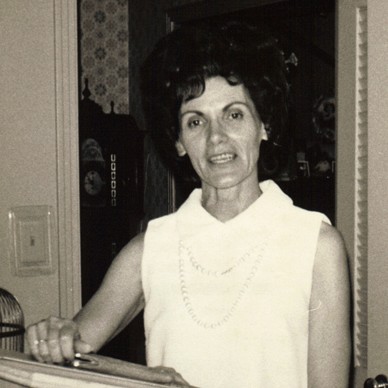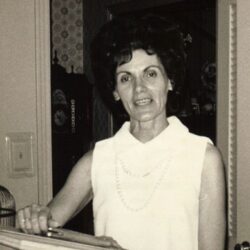Louise Brazzel Johnson
Union Parish businesswoman, civic leader, and politician Louise Brazzel Johnson was the first woman elected to the Louisiana House of Representatives from her northern Louisiana district.

Courtesy of Louisiana Tech University Special Collections
Louise Brazzel Johnson. Unidentified
Union Parish businesswoman, civic leader, and politician Louise Brazzel Johnson was the first woman elected to the Louisiana House of Representatives from her northern Louisiana district. Though she had a lifelong interest in educational, economic, and leadership opportunities for women, she is best known for her outspoken opposition to ratification of the Equal Rights Amendment (ERA).
Louise Brazzel Johnson was born in Dubach in Lincoln Parish on October 6, 1924, the daughter of Thomas A. and Ethel Holley Brazzel. She attended public schools in Lincoln Parish and studied briefly at Missouri’s Chillicothe Business College. Married to Sam Johnson of Dubach, she had one son, Samuel Wayne Johnson. In Bernice, where she and her family lived after 1943, Johnson was active in civic and church affairs. In the 1960s she founded a successful insurance agency and later gained national recognition for her business accomplishments.
In 1971 Johnson joined other critics of the outgoing gubernatorial administration of John J. McKeithen in calling for reform in state politics. She endorsed Edwin W. Edwards for governor and ran successfully for a state house seat from the newly created Eleventh District, which included Union and Claiborne Parishes. Johnson’s victory over a powerful incumbent, state Speaker of the House John Garrett, surprised many observers who gave her little chance because of her gender and inexperience. Johnson later recalled that these supposed “liabilities” had little effect on her candidacy. In her campaign she argued that “men had gotten the state in its adverse position; a woman certainly couldn’t do any worse.”
In the legislature, Johnson pushed effectively for capital projects for her district and showed a special interest in education and health care. Her most controversial position was her strong stand against ratification of the ERA. Johnson frequently expressed impatience with “old boy” practices in business and government. But while she was critical of anyone who discounted the abilities of women or limited their opportunities, like many other conservative southern Democrats, she was also suspicious of the federal government’s activism. Rather than solving women’s problems, Johnson argued, the ERA would likely make them worse. She also cited strong antipathy toward the amendment among her rural northern Louisiana constituents, whose wishes she had pledged to represent. Johnson took pride in the role she played in defeating the ERA. She maintained her opposition despite reported death threats and accusations by amendment supporters that she was “an ignorant Southern Belle, a fool, and a shame to females.”
Rather than seek reelection to the house, Louise Johnson ran for state senator in 1975 and was narrowly defeated by fellow Democrat Charles C. Barham of Ruston. Four years later, she made an unsuccessful bid to recapture her former seat in the house, after which she retired from electoral politics. After her husband’s death in 1978, Louise remained active in business and civic affairs. She worked as director of public relations and special programs at Farmerville radio stations KTDL and KWJM, and she also played a major role in organizing and promoting Bernice’s annual Corney Creek Festival. At the same time, Johnson returned to school, completing a bachelor’s degree in business administration at Louisiana Tech University in 1979. In 1984, she earned a master’s degree in history from the same university, where she studied under one of Louisiana’s most respected historians, Morgan D. Peoples.
Johnson explained that she studied history to acquire the skills necessary to research and chronicle the experiences of Louisiana’s pioneer women legislators. To mark the fiftieth anniversary of the election of state senator Doris Lindsey Holland, the first woman to serve in the Louisiana legislature, Johnson published a book entitled Women of the Louisiana Legislature, 1936–1986. Johnson’s book provides a useful collection of biographical sketches of nineteen women who overcame gender and, in some cases, racial barriers to serve in the Louisiana legislature. Subjects of her book included future US senator Mary Landrieu and future governor Kathleen Babineaux Blanco.
Louise Brazzel Johnson died in Ruston on January 6, 2002. Prior to her death, she endowed the Louise B. Johnson Scholarship at Louisiana Tech. This scholarship provides financial support to female graduate students for thesis research related to Louisiana history or women’s history.
